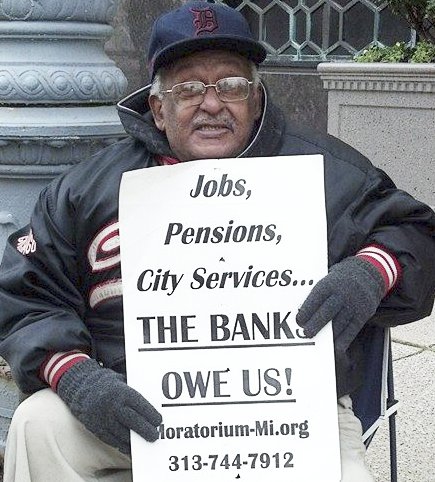

A dynamic “Emergency People’s Assembly to Stop Tax Foreclosures” on March 14 planned a series of actions to demand a moratorium on all tax foreclosures in Detroit and all of Michigan’s Wayne County. The assembly also voted to demand the release of the $251 million in unspent federal “Helping Hardest Hit Homeowner” funds by the state of Michigan to help meet the crisis.
With its neighborhoods already devastated by years of mortgage foreclosures due to racist, predatory lending by the major banks, Detroit is now being threatened by an unprecedented wave of property tax foreclosures. These foreclosures are a direct result of Detroit’s primarily African-American homeowners being forced to pay property taxes based on assessments that dramatically overstate the actual value of their homes.
Sixty-two thousand Detroit homes are scheduled to go into tax foreclosure on March 31; 37,000 of them are occupied and 18,000 are owner-occupied. The Wayne County treasurer acknowledged that as of March 10, even after placing numerous homeowners in payment plans (delaying the inevitable), over 10,000 homeowners still face the loss of their homes, along with 19,000 other families facing evictions who are renters or on land contracts.
What makes this situation even more disgusting is that federal funds are available to pay off delinquent property taxes on occupied homes! When the banks were bailed out by the federal government for $700 billion in 2008, the Treasury Department allocated about $50 billion to keep families in their homes.
Beginning in 2010, the state of Michigan received $498 million in Helping Hardest Hit Homeowner funds, which can be used to prevent tax foreclosures. Incredibly, as of January, Michigan still had $251 million in unspent Hardest Hit funds according to the most recent Treasury report.
Assembly adopts emergency actions
The emergency assembly was co-chaired by Abayomi Azikiwe from the Moratorium NOW! Coalition and Rebecca Fritz, a mother of five who took over an abandoned Detroit house and turned it into a home for her family when they were confronted with homelessness after exhausting their allowance for remaining in a homeless shelter. Fritz has been defying efforts to remove them for the past year.
Other homeowners challenging eviction as a result of tax foreclosures spoke out, including Kenny Brinkley, an 80-year-old Motown musician who, along with his partner Sandi Combs, are fighting to stay in their 60-year family home. A military veteran with disabilities and his partner testified how they lost their home to an “investor,” as is the pattern with many tax foreclosures. Detroit Eviction Defense has led many demonstrations that have prevented the evictions of these families.
Vanessa Fluker, a leading anti-foreclosure attorney, reported how she has been contacted by African-American churches in Detroit facing tax foreclosures, despite their tax-exempt status. That is because their water bills are being illegally treated as tax liens by Wayne County.
Cecily McClellan, a former Detroit city worker, spoke of how she formerly worked in the city’s Department of Human Services, where she would help process emergency needs requests that would disburse federal funds to keep people in her homes. McClellan lost her job when DHS was privatized after the state began withholding emergency needs funds from Detroit. Alice Jennings, lead attorney in the class action challenging water shutoffs, reported how the Detroit Water and Sewerage Department has announced plans to resume the shutoffs with the end of winter, targeting 38,000 additional families with deprivation of this most basic human necessity. Pat Driscoll, a retired steelworker and leader of Detroit Eviction Defense’s tax foreclosure committee, explained how the foreclosure process operates, and the outreach DED has been doing throughout the community to fight the epidemic.
The assembly adopted the demands of calling for a moratorium on tax foreclosures of all occupied homes, and immediate release by the state of the federal Helping Hardest Hit funds to keep families in their homes. It adopted the suggestion by Wayne County Commissioner Martha Scott to pack the commissioners’ next meeting on March 19 to press these demands, and a resolution brought by G. Errol Jennings of the Russell Woods Community Association to pack the Detroit City Council meeting on March 24.
The assembly called for a demonstration on Tuesday, March 31, the last day before the foreclosures go into effect, at the Wayne County Treasurer’s office, to demand they be suspended and that the treasurer join the people in demanding release of the Hardest Hit funds.
The gathering also supported a petition campaign initiated by the Detroit People’s Platform demanding a halt on the foreclosures. It adopted a resolution brought by Jean Vortkamp from Moratorium NOW! inviting Leilani Farha, U.N. special rapporteur on housing, to come to Detroit and investigate the foreclosures as violations of international law.
This statement was recently issued by over 30 groups. On Friday, March 28, Dr. Helyeh…
By Jeri Hilderley I long for peace and ease as stress and anxiety overtake me.…
Los siguientes son extractos de la declaración del Gobierno de Nicaragua del 9 de abril…
The following are excerpts from the statement of the Nicaraguan government on April 9, 2025,…
The following is a statement from the organization Solidarity with Iran (SI) regarding the current…
By Olmedo Beluche Beluche is a Panamanian Marxist, author and political leader. This article was…